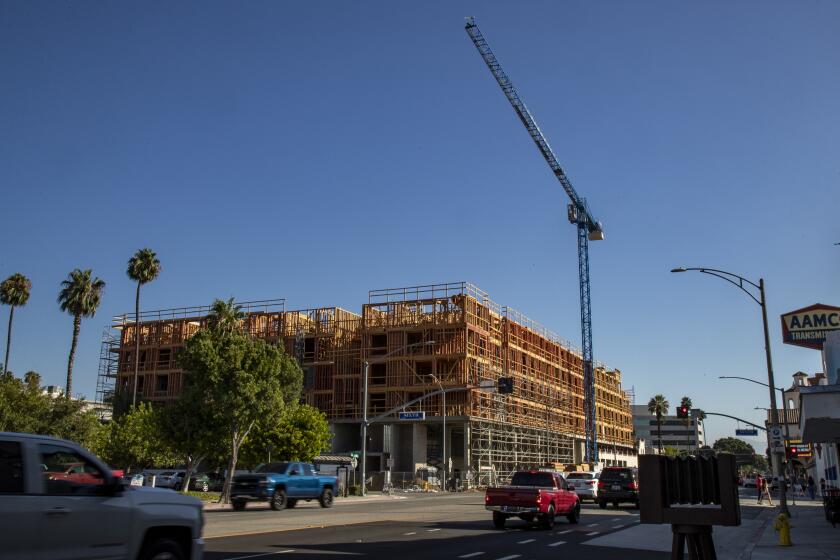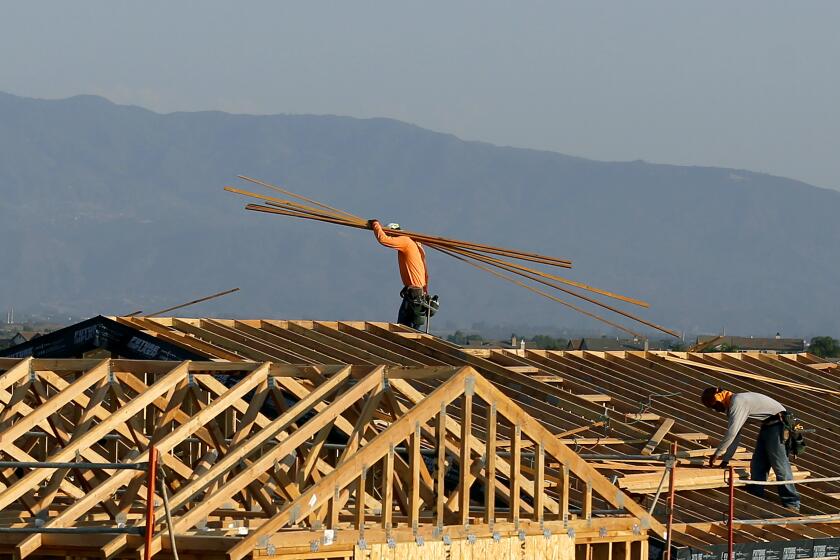Editorial: California cities want to stop fast-tracking affordable housing construction. Bad idea

Whatâs expected to be the most contentious housing bill before California lawmakers this year shouldnât be controversial at all. Itâs an extension of a proven model that has helped put affordable housing in some of the stateâs most Not In My Backyard communities.
The gist of Senate Bill 423 is this: If a city hasnât built enough housing, it must streamline approval of apartments, condos and townhouses that comply with zoning and design rules and include affordable units. The bill wouldnât override local zoning or control. It simply compels cities to follow their own land-use plans without putting projects through additional environmental reviews or city council votes that can be used to kill or whittle down housing developments.
And it works. Legislators enacted this fast-track approval process in 2017 when they passed SB 35 by Sen. Scott Wiener (D-San Francisco). Between 2018 and 2021, developers statewide proposed nearly 18,000 units using the law. About 75% of the units have been affordable for low- and very low-income households, according to a preliminary analysis by UC Berkeleyâs Terner Center for Housing Innovation. The projects get the green light in about six months, shaving months or years off the usual approval timeline.
Assembly Bill 2011 would transform strip malls into housing and pay union-level wages to construction workers. Sounds like a win-win.
In Los Angeles, developers have sought fast-track approval for 33 projects with a total of nearly 3,000 housing units, according to the Planning Department. About 98% of the units are affordable. Developers say SB 35 has done more to accelerate affordable housing construction than almost any other reform in the state; itâs a critical tool to ease the stateâs homelessness crisis by getting new low-income homes built faster.
SB 35 will sunset at the end of 2025. The new bill, also written by Wiener, would make the SB 35 approval process permanent, clarify the rules so itâs harder for cities or developers to skirt the requirements, and change the labor standards to make it easier for mixed-income developments â projects that have market-rate and affordable units â to take advantage of the fast track.
It should be an easy decision to renew a law that has delivered measurable results, but the League of California Cities and numerous local governments oppose the extension bill. They argue it tramples on local control, even though SB 35 and SB 423 say developers must follow citiesâ existing zoning and design standards. It sounds like some cities want local control in order to say no to projects theyâve already said yes to in their land-use plans. Thatâs exactly what created the housing shortage that is driving up rents and home prices in the state and fueling homelessness.
The Newsom administrationâs first target is San Francisco, the super-liberal city that may be the NIMBYist of them all.
For decades local elected officials were required by law to adopt detailed plans showing where they could put new housing â even if they had no intention of allowing that housing to be built or they knew it would be impossible to build housing on those sites. There was no penalty for cities that flouted their responsibility to plan for housing, fell far short of hitting their housing targets or bent to NIMBY demands to block housing projects that comply with local land-use rules.
That has changed. SB 35 was one of the first efforts to put teeth behind the stateâs housing laws. SB 35âs fast tracking is allowed only in cities that have failed to meet their housing construction targets, which is most cities in California, including Los Angeles. SB 423 would also require streamlining in dozens of cities that have failed to adopt state-approved housing plans, which include Huntington Beach, West Covina, Malibu and South Pasadena.
Citiesâ rallying cry of âlocal controlâ doesnât carry the same power it once had. Legislators and Gov. Gavin Newsom have passed many bills that require local governments to approve housing, and for good reason: The housing shortage threatens the stateâs prosperity and livability.
Voters largely backed pro-housing ballot measures and rejected measures aimed at making it hard to build in communities.
The most controversial aspects of SB 423 are its wage and labor provisions. Under SB 35 and SB 423, 100% affordable projects have to pay construction workers union-level prevailing wages but not necessarily hire a union workforce. Mixed-income projects have to hire âskilled and trainedâ labor, which effectively means union construction workers and apprentices. But only 1 in 7 workers in the construction industry qualify as skilled and trained, and most of them are building public and private infrastructure. The limited number of skilled and trained workers makes it harder and more expensive for developers to build mixed-income housing under SB 35, which is why most projects using the fast-track approval have been 100% affordable developments.
Thatâs why the California Conference of Carpenters has supported removing the skilled and trained requirement from SB 423. Itâs a smart move because it would encourage more housing construction while ensuring workers are paid well, protected and offered a path to union membership. The State Building and Construction Trades Council and the California Labor Federation want to keep the requirement, and the two politically powerful groups have quashed most bills that didnât toe their line.
But, again the mood has shifted in Sacramento, and lawmakers recognize the severity of the housing crisis. With SB 423, the state can make it much easier to build mixed-income housing that provides affordable units with no public subsidies. State leaders know this model works. They just need the courage to say yes.
More to Read
A cure for the common opinion
Get thought-provoking perspectives with our weekly newsletter.
You may occasionally receive promotional content from the Los Angeles Times.













